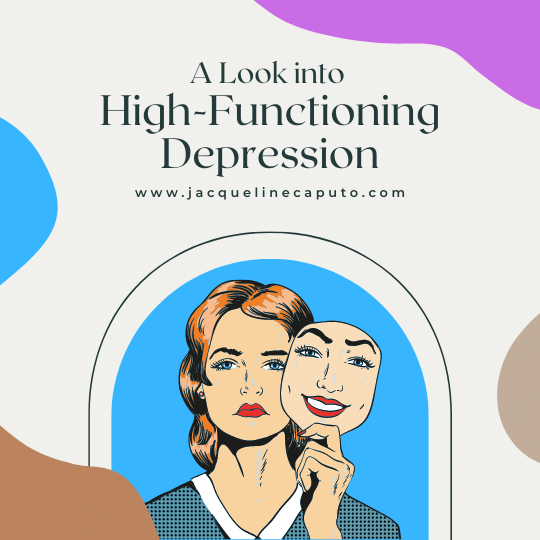A Look Into High-Functioning Depression
Many times in life, we can be very hard on ourselves. We pressure ourselves to act in specific ways, feel guilty when we mess up, and question our own emotions. Someone with high-functioning depression feels this way often; people with this depression question the validity of their feelings. They wonder how they could feel so low when things in their life appear to be going well. People around them also wonder the same thing.
We’ve all seen someone who appears successful and put together. You wonder how they could ever be sad. You think: this person has money, notability, a loving relationship…how could someone with all these things ever be depressed?
It is important to remember that depression is universal – it does not discriminate against anyone. Depression doesn’t care how successful or fancy your life is. Depression infiltrates the hearts and minds of people with all different lifestyles and backgrounds. You may know someone who doesn’t seem like they are affected by depression, but they are hiding their emotions deep down. Alternatively, you may be the person who is fighting back these emotions. Each person deserves support!
If you struggle with depression, know you are not alone – help and healing are out there!
What is High-Functioning Depression?
Many times, people who seem to have high-functioning depression are experiencing Persistent Depressive Disorder (PDD). As mentioned in my past article, the NIH describes PDD as a persistent (like the name states) and long-lasting depression. Someone with PDD can experience major depressive episodes, but usually, their symptoms appear more mild and manageable.
The person seems okay on the outside even if they don’t feel that way on the inside. People with PDD often camouflage their unhappy emotions and go under the radar. They might be the ones who seem to be excelling or always lighting up a room when they are actually feeling terrible on the inside.
What High-Functioning Depression Feels Like
As mentioned before, people with high-functioning depression may seem put together on the outside but can really be struggling underneath it all. You may wonder how they can feel depressed, and they may be wondering the same thing.
People with PDD often think to themselves:
- I have no reason to feel sad.
- I have a good job, a roof over my head, some good friends who support me…so why do I feel this way?
- Sometimes the sadness devours my entire day. Then I feel bad for feeling bad!
- I don’t know why, but I can’t seem to shake this feeling of sadness.
- I’m successful, and people look up to me. I shouldn’t feel this way.
- It’s hard to remember a time when I didn’t feel this weight on my chest.
- I just want to feel happy again.
- What if I never stop feeling this way? What if I’m just sad forever?
- I’m just so tired of dealing with PDD.
High-Functioning Depression is More Common Than People Think
It may feel like you are alone when dealing with this type of depression. People may be counting on you, and you fear showing your emotions because you don’t want to let anyone down. You feel obligated to keep up this front and look successful/happy. Please remember that it is okay to show and feel your emotions. It does not make you weaker at all! You are very strong for acknowledging your emotions and allowing yourself to be vulnerable. You do not have to suffer alone – help is out there!
Also, remember that many people are experiencing the same thing you are. Just think: if you struggle with depression, but it is not apparent to the people around you, there must be so many other people doing the same thing. While it’s hard to say precisely how many people struggle with high-functioning depression, visit online forums long enough, and you’ll know that you aren’t alone.
It’s hard to know when to ask for help because you know that everything looks okay from the outside. You may be afraid to break down the walls you’ve been putting up for so long. As mentioned in my past article, Cheslie Kryst might have experienced similar feelings.
Cheslie was a former Miss USA winner and attorney. Tragically, Cheslie died by suicide back in January. Her family and friends remembered how amazing Cheslie was and thought she suffered from high-functioning depression. Looking at Cheslie Kryst’s life, some people may be shocked to think she was struggling – they saw the shiny glitz and glamour of her crown but couldn’t see the pain hidden behind it all.
I send my deepest condolences to the loved ones of Cheslie Kryst and hope they are finding healing and support.
Therapy Can Help You
If you are feeling down about your depression, know that therapy can help! You may feel like there is “no reason” for you to be sad, and that is okay! We can explore the things going on in your life, get to the root of your struggles, and find ways to help improve your days.
Many times, my clients need to check in with themselves and ask the important questions:
- Are your goals for life or expectations for your future really yours? Or are you living out someone else’s dreams?
- Do you have any regrets? What would you be doing if you had no fears of failure?
- Do good people and healthy environments surround you? What is toxic in your life?
Therapy can also help feel realigned. Our bodies need to be adjusted from time to time, and our minds can also benefit from this work. Therapy can help you rewrite the story of your depression and realize that healing is possible!
It’s Time to Stop Blaming Yourself for Your Depression
High-Functioning Depression tends to make us believe that we are isolated in our feelings and have to face it all alone. You are not “defective” or wrong for feeling the way you do; you are just HUMAN! We all experience ups and downs in life; if you are in a low period of your life, remind yourself of what you deserve – the answer is love and support.
You are so much more than your depression – you contain an infinite amount of worth. You deserve to live a happier and healthier life! Therapy can help you handle your emotions in healthy ways, develop coping strategies, and heal.
I see you, and I’m here to help.
Ways to Cope With High-Functioning Depression
- Validate your emotions
- Allow yourself to feel your emotions and honor them. You have a right to feel how you feel – this is true even if people rely on you or you don’t want to let others down. You need to remind yourself that your struggles matter, even if you are the only one who can see them.
- Lean on Support
- Share with your loved ones how you are feeling. Just because someone didn’t realize you were struggling doesn’t mean they won’t care. Go to people who will listen to you vent, give support, and help comfort you.
- Practice Self-Care
- When feeling down, take care of yourself by doing things that promote feelings of happiness, calmness, and wellness in you. Participate in your favorite hobby, visit somewhere you feel safe, allow yourself to rest, take breaks, etc.
- Seek Therapy
- Therapy can help you handle your depression and find ways to cope. A therapist can provide a safe space for you to deal with your emotions, open up, and break walls down. Through therapy techniques like CBT, you can learn to reframe your thoughts to be more positive and less catastrophic.
If you or someone you love needs help, here are some additional resources:
- National Suicide Prevention Lifeline: 800-273-8255
- National Suicide Prevention Lifeline’s Website: https://
suicidepreventionlifeline.org/ - SAMHSA’s National Helpline: 1-800-662-HELP (4357)
- National Domestic Violence Hotline: 800-799-7233

About the Author
Jackie Caputo is a Licensed Marriage and Family Therapist who provides therapy in Woodland Hills, CA. She also provides online therapy in California to individuals throughout the state.

